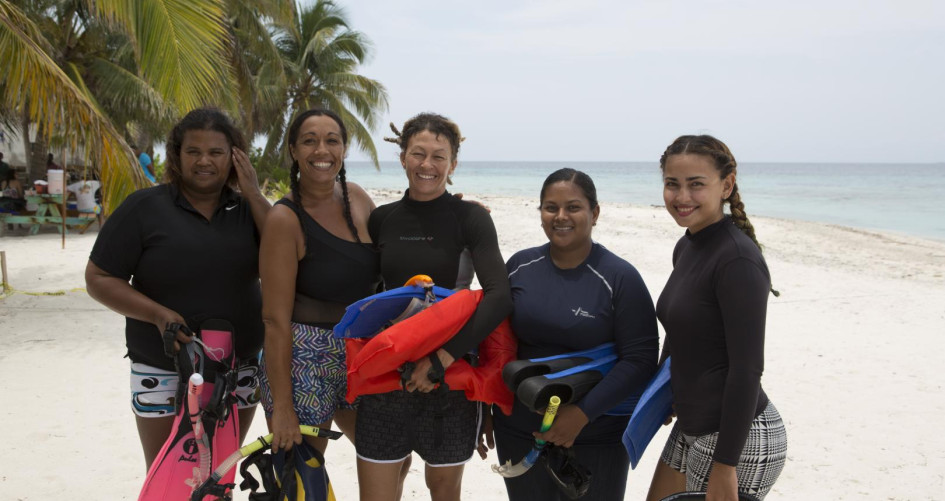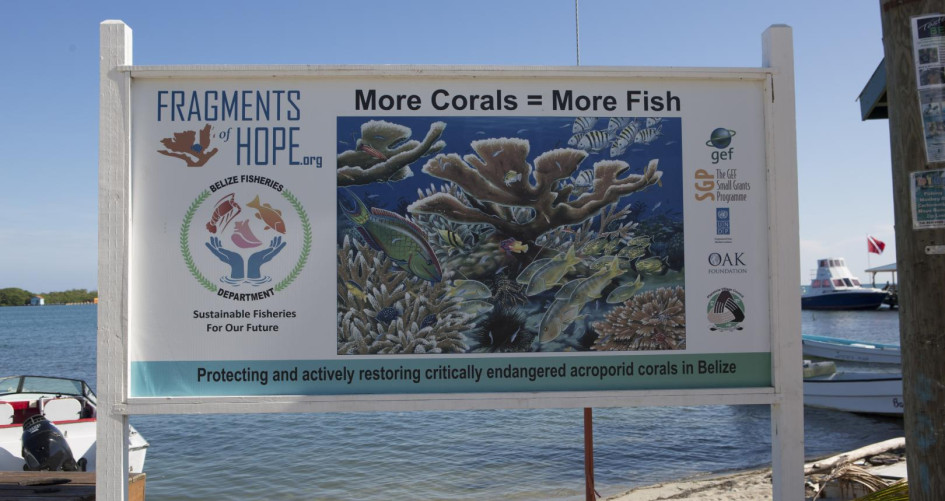Lisa Carne is the founder and executive director of Fragments of Hope, a community-based organization located on the Placencia Peninsula in Belize. Under her direction, the organization restores coral reef habitats and advocates for the sustainable management of these habitats.
Lisa was southern Belize’s first female diving instructor in a male-dominated industry. She offers women grant-funded or subsidized training programs on marine tourism and lagoon ecology to restore coral reef habitats. Women constitute half of the 15 trained diving instructors, who earn a relatively high salary in the area.
So far, 90,000 corals have been transferred from nurseries into nature in three different national parks and marine reserves, thus empowering women to take meaningful climate action by preserving this important marine ecosystem and habitat.
Key facts
- Women who have received training can earn 3 times more than Belize’s minimum wage;
- So far, 90,000 corals have been transferred from nurseries into nature in three different national parks and marine reserves;
- In the last two years, 30 people have been trained on mangrove and coral restoration efforts;
- 166 hours of guide training has been provided.
The problem
Caribbean acroporid corals are listed as ‘critically endangered’ on the International Union for Conservation of Nature Red List. More than 98% decline in coral population abundance and distribution is because of the increased frequency and severity of storms, and rising sea temperatures linked to coral bleaching and diseases. Erosion is a critical issue facing all of Belize's coastline, and is also partially attributed to climate change.
The solution
Fragments of Hope founded by Lisa Carne restores coral reef habitats and advocates for the sustainable management of these habitats. Coral restoration efforts in Belize are conducted by trained fishers and tour guides, who work closely with regulatory agencies such as the Belize Fisheries Department.
Restoring shallow coral reef habitats and mangrove populations are hands-on management activities that contribute to shoreline and habitat protection over the long term. Lisa oversees ongoing work in Belize that focuses on the identification and propagation of temperature tolerant coral. Her work has created 28 gene bank nurseries of the threatened coral species and a genetically diverse coral population has now been reestablished, and spawning has been documented (2014-2017), facilitating natural recovery. More than 90,000 corals have been planted-out and their thermal tolerance documented. These corals survived their first hurricane (category 1), in August 2016.
Training and hiring women in the area of tour guiding and PADI SCUBA diving has increased their earning potential and standing in what was a male-dominated sector.
Helping the planet
Healthy coral reefs are among the most biologically diverse and economically valuable ecosystems on earth. Providing many vital ecosystem services, healthy coral ecosystems are a source of food for millions. Corals also help protect coastlines from storms and erosion, provide habitat, spawning and nursery grounds for economically important fish and invertebrate species, provide jobs and income to local economies from fishing, recreation, and tourism, are a source of new medicines, and are hotspots of marine biodiversity.
This project has replenished many coral reefs and mangroves through a programme of restoration and propagation work in Belize. The goal is to build resilience to climate change and improve reef functionality and structure, thereby allowing for a habitat for fish and other marine species.
Helping people
Women in coastal communities receive funded training to become tour guides and receive a Professional Association of Diving Instructors (PADI) SCUBA certification up to dive master level. The lagoon ecology training activity is designed to provide local tour guides with an additional income earning options compared to the standard marine and terrestrial tours currently offered.
Lisa Carne was the first female PADI SCUBA instructor in southern Belize in an industry that was previously male dominated. She has inspired other local women to follow suit by providing tour guide training, vetted by the Belize Tourism Board, the 1st certification level of diver training (open water), through to dive master PADI certification, Advanced Marine Tour Guide course, underwater photography, lagoon ecology training, and reef replenishment training.
Training is offered in the evenings to accommodate working women, which makes it possible for single mothers to attend. Research, monitoring, and science are also traditionally male dominated areas, so providing access to training in the tourism and marine conservation sectors has unlocked opportunities for local women to earn higher daily wages than in the domestic or server sectors.
Spillover effect
Areas receiving the planting of nursery grown corals are steadily increasing and reef restoration work has expanded to other protected areas (South Water Caye Marine Reserve and Turneffe Atoll Marine Reserve (2016-2019). Fragments of Hope has also held training in Jamaica, Colombia and St Barth's, all of which have coral restoration programs in place. Laughing Bird Caye National Park is recognized as the oldest (since 2006) and most extensive (over one hectare) reef restoration example in the Caribbean. Private funding is increasingly enabling the restoration of more coral reefs.
Numerous similar areas around the world could benefit from the methodologies being implemented by Fragments of Hope, as the methods and training are easily replicated and are inexpensive. For example, the reef replenishment course has a manual, three training videos, and a curriculum, which are already deployed in Colombia and St Barths.




Images owned by the activity partners, all rights reserved.



